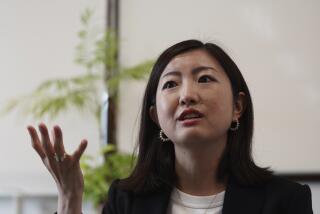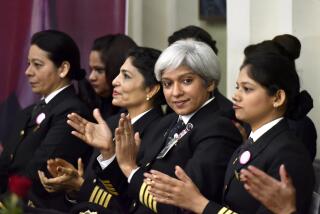In Japan, Flight Attendants Have an Air About Them
- Share via
TOKYO — She’s bright and disciplined, with a flair for languages. She’s about to graduate from a top school, eager for a prestigious career.
International business? Law? Diplomacy? No--serving drinks and demonstrating how to use flotation devices.
In Japan, becoming a flight attendant--a soochoowadesu--is a dream come true. Tens of thousands of young women line up every year for scarce spots on the cabin crews of the three major Japanese airlines. Those who succeed are the envy of their peers.
It’s reminiscent of America in the 1960s, when serving food and drink on airplanes had a glamorous popular image. In modern-day Japan, the phenomenon says a lot about opportunities for women and standards of feminine behavior.
“Stewardesses meet the most beautiful ideal of womanhood: intelligent, beautiful and gentle,” said Kumi Kaseya, deputy editor of Stewardess Magazine, read every month by 30,000 fans and wannabes.
On U.S. and other foreign airlines, flight attendants often enjoy long careers and are rewarded for flight experience, seniority and knowledge of safety procedures.
For Japanese flight attendants--almost all of whom are women--youth and beauty are absolute requirements, even if the airlines won’t say so directly. Most retire after five or 10 years.
During those years, though, they’re members of an elite, trend-setting club. Many Japanese women snap up any designer shoe or cosmetic cream that news reports say is favored by flight attendants.
“A stewardess doesn’t show her inner self, but there’s a strength inside. That’s why I think it’s such a wonderful job,” said Hayaka Komori, 19, a student at a Tokyo training school for flight attendants. Only one in four of the students gets a job.
Those who promote the flight attendant ideal acknowledge that lack of opportunity elsewhere helps make it such a competitive career path. During Japan’s four-year recession, it became common for big companies to simply announce that they would not be hiring any women that year.
“Japan is different from America,” said Kaseya, the magazine editor. “The fields of work where women can fully use their potential [are] limited.”
In Japan, where female office workers are often expected to make tea and tidy up after their male colleagues, becoming a flight attendant offers women a greater payoff in prestige for the kind of subservience that would probably be expected of them anyway.
Still, purveyors of the flight attendant dream wouldn’t win any prizes in the West for political correctness.
“The desire to give good service is something that’s inherent in women,” said Kaori Umezawa, a teacher at the training school and a former Japan Airlines flight attendant.
Japanese flight attendants follow famously strict rules on appearance. All Nippon Airways, for instance, forbids earrings more than one-tenth of an inch in diameter, hair below the shoulders or more than one ring.
The airlines rule out women with birthmarks on their wrists, as passengers might be discomfited by the sight. Even on exhausting long-haul flights, no one on a Japanese cabin crew would dream of being caught with a hair out of place.
With their own attention to appearance and strictly proscribed behavior, Japanese airline officials are privately horrified by what they see as lax standards on some Western carriers.
Japanese stewardesses are trained, for instance, to use such phrases as: “O-nomimono wa nani ni nasaimasu ka?”--meaning literally: “What would you honorably like for your honorable drink?”
Passengers here pay dearly for this standard of service--in the form of much higher ticket prices.
A Tokyo-to-Sapporo round-trip flight--a domestic flight of about 500 miles--costs $410. A domestic U.S. flight from New York to Chicago, considerably longer, can cost as little as $150.
The airlines have tried to cut costs in the last two years by hiring all flight attendants on three-year contracts and cutting salaries by a third. When the contracts are up, some may lose their jobs.
While some Japanese say salary cuts and the fact that air travel is so commonplace have made the job less prestigious, airlines say there’s no noticeable drop-off in applicants.
Kazuko Wakata, a manager at All Nippon Airways, said about 20,000 women applied over the past year for flight attendant positions. The airline hired just 700.
More to Read
Sign up for The Wild
We’ll help you find the best places to hike, bike and run, as well as the perfect silent spots for meditation and yoga.
You may occasionally receive promotional content from the Los Angeles Times.






